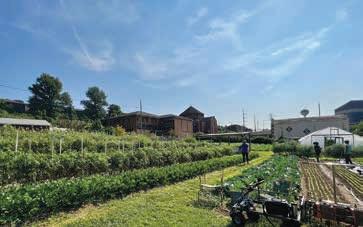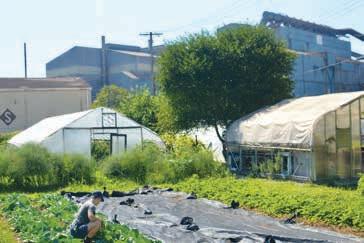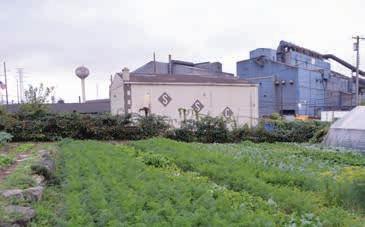
4 minute read
Grow Pittsburgh, Grow

by Martin Miron
Advertisement
Grow Pittsburgh was established in 2005 by three urban farmers, Barb Kline, Mindy Schwartz and Randa Shannon, who saw a need for an urban agriculture organization in Pittsburgh that supported urban farming within city limits and provided resources, education and support for growers. Kline says. “We incorporated as a nonprofit in 2008, after four successful programs had been established, including Braddock Farms, the Edible Schoolyard Pittsburgh, the Frick Greenhouse and its accompanying Shiloh Farm, and the summer internship program. Our programing has grown substantially since then, and our work today can be summarized in three main approaches.”
They teach people to grow food through a school garden curriculum, teacher training, workforce development for youth, adult workshops and other resources. Grow Pittsburgh grows food for the community at urban farm sites and provides affordable, chemical-free, fresh fruits and vegetables at farm stands and via donations to free food distributions. Since 2022 the work has been aided by expansion into Wilkinsburg at the Garden Dreams Urban Farm & Nursery production site. They also build and support gardens for PreK12 schools and communities throughout Allegheny County.
Their major crops are beefsteak tomatoes, bell peppers, collard greens, kale, carrots, red beets, salad mix and zucchini. Others include okra, onions, celery, cucumbers, eggplant, green beans, berries, turnips, radishes, spinach, peas and herbs. Shannon says, “We also do a spring plant sale. We are also a vendor at the Wilkinsburg Farmers Market and provide produce for the Homewood Farmers Market and a few partner community initiatives that provide produce directly to families and seniors.”
Produce is available across the city this summer: Braddock Farm Stand, Wednesday 3:30 to 6 p.m. Friday 3:30 to 6 p.m. Saturday 9 a.m. to noon; Shiloh Farm Stand, Thursday 2:30 to 6 p.m.; Wilkinsburg Farmers Market, Thursday 3 to 7 p.m.; Homewood Farmers Market, Saturday 9 a.m. to noon.

Schwartz explains, “We use all-natural, chemical-free growing methods. We cover crop every year and use reduced tillage to improve soil quality, which has improved dramatically over the years since beginning as a vacant lot. We use only organic approved fertilizers and pest control products. Our Shiloh Farm site keeps egg-laying chickens and bees. We provide our chickens with plenty of space and lots of vegetable fresh vegetable scrap. We have very happy hens.”
Shannon reports, “Our mission is to teach people how to grow food and promote the benefits gardens bring to our neighborhoods. The staff is made up of 20 full-time members dedicated to our school gardens, community gardens and farm production sites. We also have about 10 seasonal staff members helping at our production sites throughout the growing season.”
Braddock Farm came online in 2007 with the mission of providing fresh produce for the Braddock community and creating on-farm educational opportunities. In 2006, the mayor of Pittsburgh approached Grow Pittsburgh executives offering cityowned space in Braddock to manage. This project grew slowly as there were multiple issues to deal with. Then they started to rehabilitate the soil and create a space that could provide fresh produce to all residents.
By 2008, there were several raised garden beds established on the property selling produce at the farmstand. Now at nearly one acre, the farm includes three hoop houses, a greenhouse, an office and a walk-in cooler, plus the roadside farm stand. Line says, “Our staff and programming have grown, too, and we now offer fresh produce for sale in Braddock three days a week, while serving nearby community markets in Homewood, North Point Breeze, and Wilkinsburg.” Three other production sites are Shiloh Farm, The Frick Greenhouse and Garden Dreams.
Shiloh Farm is a model of what is possible in urban agriculture on one city lot. Since 2008, Grow Pittsburgh has exchanged produce for the use of this formerly vacant lot at the corner of Homewood Avenue and Thomas Boulevard, in Point Breeze. Kline notes, “We’ve converted the lot into a small urban farm, complete with in-ground production beds, herbs, figs, raspberries and flowers to draw beneficial insects. Shiloh Farm even has a beehive and a small flock of chickens so we can use local honey and eggs in our workshops and programs. The garden’s back perimeter is marked by a large solar array, which feeds into the neighboring home.”
Garden Dreams Urban Farm & Nursery is Grow Pittsburgh’s newest production site, located at 806 Holland Avenue, in Wilkinsburg. “In Summer 2021, we completed construction of a 2,800-square foot net zero energy greenhouse at Garden Dreams that is powered by an onsite solar array,” she says. “This urban farm and plant nursery, previously owned and operated as a private business by Grow Pittsburgh co-founder Mindy Schwartz, was a treasure in the local urban agriculture community for nearly 20 years. In December 2019, Schwartz donated the property to Allegheny Land Trust to own and preserve with Grow Pittsburgh partnering to run the urban farm and greenhouse operations. The urban farm and greenhouse at Garden Dreams provide plants to urban farmers, schools, community gardeners and home growers throughout our community.”


Grow Pittsburgh hosts open houses and a Zucchini Festival in July and Fall Festival in October. There is a six-week employment and educational program for teens each summer in which students are intimately involved in the workings of the farm from seeding to harvest, additionally learning about leadership, teamwork and how their actions affect the larger food system.
There is a two-year pre-apprenticeship program in partnership with Pasa Sustainable Agriculture for those that have little or no growing experience, but are interested in exploring a farming career. Participants volunteer four hours per week doing a variety of farm tasks and receive a share of vegetables, as well as free admission to relevant workshops and conferences. Open workshops throughout the year backyard farming practices, how to start a community garden and much more.
Kline advises, “While we work on our strategic plan for 2022 through 2026, our focus is to ensure that all people in our community have the resources, capacity and knowledge to fully realize the benefits that food-growing projects bring to our neighborhoods.” Their three goals are to cultivate the future of urban agriculture in the region by building sectorwide capacity; deepen and enact justice, equity, diversity, and inclusion (JEDI) efforts across the organization and the greater community; and prioritize internal efficiencies and capacity for organizational stability.

Grow Pittsburg is located at 587 Hamilton Ave. #2W, in Pittsburgh. For more information, visit GrowPittsburgh.org.









